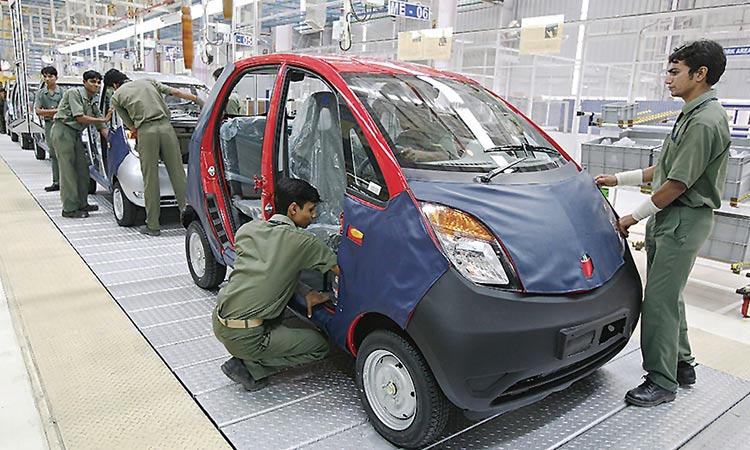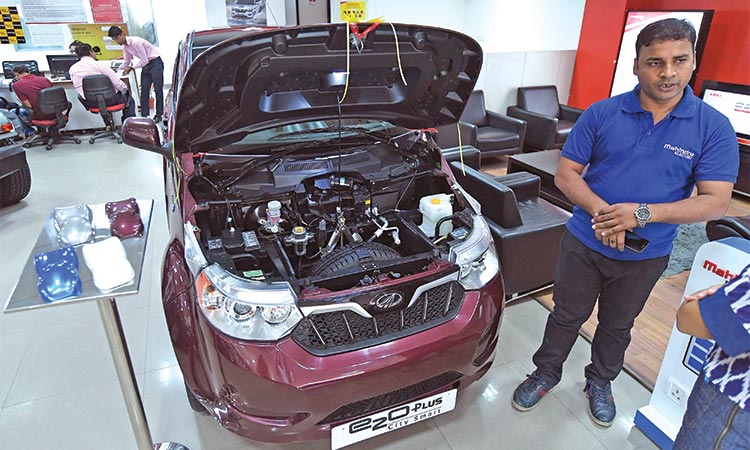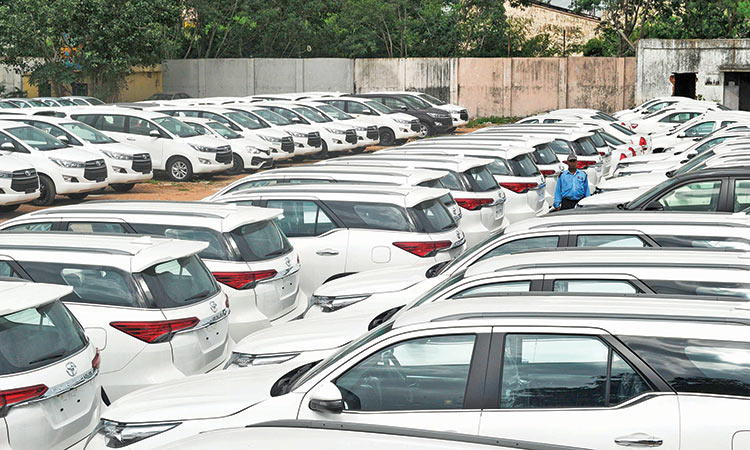Top Indian automakers plan cuts in output amid industry crisis

An electric car on display at a showroom in New Delhi. Agence France-Presse
The slowdown in the sector has triggered massive job cuts, with initial estimates suggesting that automakers, parts manufacturers and dealers have laid off about 350,000 workers since April, a senior industry source told Reuters earlier this week.
Tata Motors, which had previously flagged a “challenging external environment”, said it closed some blocks at its Pune plant in the western state of Maharashtra.
The company, India’s top automaker by revenue, had last month posted a bigger-than-expected quarterly loss due to weak conditions at home and problems at its British luxury car unit.
M&M said on Friday its automotive segment, which makes passenger and commercial vehicles and spare parts, would cut production for 8-14 days at various plants during the second quarter.
Shares of Tata Motors and M&M fell between 1.8% and 2.4% before cutting losses in a broader Mumbai market that was 1.3% higher.
The crisis has also hit smaller auto parts makers like Jamna Auto Industries Ltd. The company, whose customers include Tata Motors, General Motors Co and Toyota Motor Corp, said on Thursday it might shut all its nine plants in August due to weak demand.
“In view of the weak customer schedule and high inventory, the company has made changes in production schedule at all its plants. The plants may not run or partially run on all working days in August,” Jamna Auto said.
Jamna Auto’s shares fell as much as 8.5% on Friday.
Auto components manufacturers Bosch and Wabco India have already trimmed production amid the demand slump.
Mahindra and Mahindra said on Thursday it plans to open a plant in Flint, Michigan, to make vehicles including mail delivery trucks for the US market, a move that could create up to 2,000 jobs.
Mahindra already produces its off-road Roxor vehicle at its manufacturing facility in Auburn Hills, Michigan, which is at full capacity.
“A significant facility expansion is envisioned to support manufacturing and assembly of new products for the US market,” Mahindra said in a statement. Production of the company’s mail delivery trucks is dependent on Mahindra winning the United States Postal Service’s ‘next generation delivery vehicle’ contract, which will be announced later this year and has four other contenders, the company said.
Mahindra said it is also in talks with several other states that have suitable sites, and its decision could be influenced in part by the financial incentives that Michigan will provide.
“While we’re keeping our options open, we think the former Buick City site in Flint would be a great fit for us,” said Rick Haas, chief executive officer of Mahindra Automotive North America.
“It’s close to our current facility, which improves overall enterprise efficiency.”
Meanwhile, the Reserve Bank of India (RBI) will cut interest rates again at its October meeting, making it the fifth in a row, according to economists in a Reuters poll who said the central bank’s decision to ease by 35 basis points on Wednesday was right.
While a survey taken ahead of August’s meeting showed a 25 basis points rate cut was a done deal, the RBI was expected to keep rates unchanged for the rest of this year.
However, a more recent Reuters poll, conducted Aug. 7-8, predicted the RBI would ease its benchmark lending rate by 25 basis points to 5.15% in October. If it does cut again as forecast it would be a repeat of a cutting spree last seen in 2000-01.
After the expected October cut, the RBI is then forecast to ease by 15 basis points to a near decade low of 5.00% in the first quarter of next year, although much depends on global conditions.
“India is amidst an economic and financial slowdown with minimal support from fiscal policy. The responsibility is being borne by monetary policy but more is needed at this front,” said Shobana Krishnan, chief economist at Edelweiss.
“Traditional parameters of growth and inflation are far from showing any near term pickup. Therefore, we believe the case for another 50 basis points cut in fiscal year 2020 is justified.”
The central bank cut rates by 35 basis points to 5.40% this week but maintained its “accommodative” policy stance, signalling further easing on concerns about weak economic growth and subdued inflation. If the RBI does cut rates in October and early next year it will be the most aggressive amongst major central banks in easing policy. The RBI lowered its economic growth forecast for the current fiscal year on Wednesday and said inflation would not breach its medium-term target of 4% in the near-term.
Reuters







